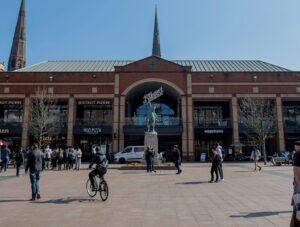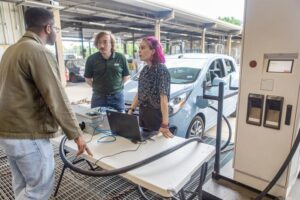Interview: Chris Mewse from Parish Online
Almost 3,000 town, parish and community councils now subscribe to Parish Online’s mapping technology service. It’s one of a number of initiatives from Basingstoke-based company Geoxphere. Managing Director and Co-Owner Chris Mewse spoke to Infotec exclusively about how spatial mapping saves local councils time and money.
What does Parish Online software do to help local councils?
The short answer is that our mapping software allows them to access hundreds of different mapping datasets, available from government agencies, local authorities and various other organisations. That helps them better manage their own parish area.

Photo courtesy of Parish Online / Geoxphere
Mainly, they use mapping for assessing planning applications and building up their own neighbourhood plans for what they want in their area. Parishes are the most local form of government and have all this local knowledge about how the area works. But they’re also underfunded and understaffed. They need tools to be able to do their jobs more easily.
You said ‘short answer’ – so it’s more complex than that.
The longer answer is that with 14 years’ work in this area, we’ve also become trusted to provide web-based technology. Parishes also want us to provide their gov.uk email addresses and websites.
Do councils come to you knowing which data they’ve got and want to work with, or do you identify it for them?
It’s a bit of both. We certainly put information in front of them that they might not have been aware of.
A good example is that we recently took all the energy performance certificates for the whole country, mapped those and shared them with our subscribers. They could then look at their area and immediately see poorly performing properties, where they could help residents and apply funding.
But they might not know that they have information within the parish council itself that we can unlock. That’s usually in the form of people – councillors, a clerk, staff or volunteers who know things like where all the grit bins are, or which streetlights the council owns. They often have that information in their heads. When a clerk and councillor leaves, that information can get lost and the council must start from scratch.
With Parish Online, these knowledgeable people can ‘brain dump’ that information into the shared system, plotting assets on a map so colleagues can easily access all this important information in the area. That might be which areas flood, or the name of the contractor who installed the playground. That data is then a permanent record and can be referred to whenever it’s needed.

Surface water flooding mapped by Parish Online
I tend to think of data as information held in spreadsheets, but you’re talking about knowledge in people’s heads.
It can be. It’s asset or information management in the more general sense. If you’ve got an organised clerk who knows everything – how many benches the parish owns, where they are, how much they’re insured for – that can be stored on a spreadsheet. That’s a perfectly valid approach.
But our pitch to that clerk is that this information is better represented on a map. For example, when you search on Google Maps for a pub, you’re shown a map with a load of red markers – each one a pub in the area. But when you click on a red marker, you get more information: photographs, opening times, reviews.
We do something similar. They can plot all that information about benches on to the map and store it, in just one point. You create a sort of spatial spreadsheet. And you can attach documents, PDFs and photos. That gives you the information you need. If the benches get damaged, you’ve got a record for insurance.
And then, when that knowledgeable clerk leaves, you retain that knowledge.
Yes, the council retains all that knowledge. A good example is a new clerk who got in touch recently to ask if we could help with their parish. In fact, the parish already had an account with us.
We gave this new clerk the login details and they had instant access to the previous clerks information. They were ecstatic as it meant they could hit the ground running.
Is the main benefit saving time?
That’s very important. Clerks typically work part time and might have another job. Some work as clerks for two of three different parish councils at once. They are stretched. We can help.
But the main benefit is that we enable parish councils to focus more on their important, meaningful work. They’re hugely important to local communities. Obviously, during COVID, they put a lot of energy into making sure vulnerable people were looked after. Now they’re involved in the problems with cost of living and cost of energy. They’ve set up warm rooms and community pantries.
These responses, which residents in the area really benefit from, often happen very fast and are very well organised at a parish council level. Higher-tier local authorities, the police or NHS, might have a strategic overview and the funding but parish councils often know what’s needed on the ground and they can react quicker.
What makes parish councils so responsive?
Local knowledge. They’re typically people who live in the area. They know who faces what challenges. With better tools to manage information, they can work on a par with those higher-tier authorities.
We’ve extended that idea to our website service because of the amount of wasted time and effort that maintaining a site can involve. Working out how the domain name system (DNS) or how to set up emails securely is hugely time consuming and doesn’t really benefit residents – which should be the priority.
What sorts of things do parish councils want put on your maps?
It can be anything. Parishes use our mapping tools for events, planning, asset management, neighbourhood plans, climate planning, flood planning – all sorts of things.
It can also be used for fun things. It’s used for planning events such as a Christmas pudding hunt around the town for kids in the area. They wanted to mark out where the puddings were placed to get a good spread around the town and to help the organisation of the event.
Ha ha! The technology is clearly adaptable to individual needs. What would you like to see it do in future?
We’ve been thinking about this a lot. Obviously, there are better ways to present mapping. As self-confessed map geeks, I think our default thinking is in ‘map view’ – an actual map. Actually, what people want is answers: automatic analysis based on that mapping data.
I think the software will go towards prompting you with answers. It’ll say to you, without being asked, ‘The lights on this street will all need maintenance in the next few weeks.’
That’s based on spatial information behind the scenes but provides a useful list of jobs the parish can get done – and pre-emptively, before the task gets more expensive. That’s something we’ve built into the development roadmap for our software. It will save parishes even more time and money.
And in the longer term?
That will be asking the mapping software questions. We’ve already seen this with integration of AI, such as ChatGPT. People have done fantastic stuff with that. We can see how valuable it would be to integrate conversational language, interpret it into a spatial search or spatial index, and return a meaningful result. Again, that’s on our roadmap.
But really we’re guided by the policies and the ‘pain points’ of our subscribers, the parishes themselves. As they face new and different challenges, it’s our job to help them.
Chris Mewse, thank you very much.

Energy Performance Certificates (EPCs) mapped by Parish Online
















Leave a Reply